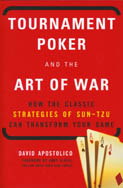
Tournament Poker and The Art of War
Testing you opponents, the power of keen observation, project a strong table image--these areas have been discussed in other books, but rarely with such keen examples, in short powerful bursts of advice.
The Inadvertent Check-Raise
I was playing in a tournament at the WSOP Circuit event at Caesar's Atlantic City when I witnessed something I had never seen before. It was either a beautiful move or an inadvertent one.  David Apostolico is the author of 'Machiavellian Poker Strategy', and 'Tournament Poker and The Art of War,' and his latest title 'Poker Strategies for a Winning Edge in Business.' David's website is www.holdemradio.com/blog/ I'll describe the scenario and let you decide before I weigh in with my own opinion.
David Apostolico is the author of 'Machiavellian Poker Strategy', and 'Tournament Poker and The Art of War,' and his latest title 'Poker Strategies for a Winning Edge in Business.' David's website is www.holdemradio.com/blog/ I'll describe the scenario and let you decide before I weigh in with my own opinion.
Here's the situation. We're about four hours into the event and the chip leader at the table is sitting on a monster stack. This guy is an absolute rock. He's only played three hands the entire afternoon, but has been doubled up each time by some obviously clueless players who hadn't noticed that the guy only plays the nuts or close to it. On this hand our rock is in the big blind. Everyone folds to the button who makes a standard three times the big blind size raise. Our rock calls which should send off our alarm bells in the button's head. The flop comes J-7-2 with two hearts. The rock is first to act and he sits there as passive and as stoic as can be. This goes on for a few minutes. I'm not one to call a clock on a player but I was getting concerned as I did not have a big stack and the blind structure was extremely aggressive in this tournament. Finally, it occurred to me that perhaps our Rock thought he had already checked. So I casually asked him if he knew it was his turn to act. He seemed genuinely surprised and immediately jumped to attention and said "I check" before apologizing for not realizing it was his turn. The button immediately fired in a big pot sized bet. The Rock immediately moved all-in. I'm rarely surprised at the poker table, but this completely caught me off guard. More importantly for the player in the hand, I could tell that the Button was totally perplexed. If you went strictly by the way the Rock had been playing, you had to give him credit for a hand instead of putting him on a move. Yet, maybe he knew his image and was taking advantage of it. But could he really have faked not knowing it was his turn to act? As the button took his time (it would cost him his remaining stack which was now dangerously short to call), I tried to figure out the Rock.
If he had checked the flop immediately and then raised the button's bet, I would most assuredly put him on a big hand. I think the button would have as well. The delay is what threw everything off. In my experience, the great majority of times that a player fails to act in turn it's because he has nothing and has already lost interest in the hand. Inevitably when he is reminded of his turn, he quickly folds (or checks as the case may be). Perhaps the Rock knew this and thought that the button had nothing but was taking advantage of the situation. Certainly, the button would bet that situation even if he completely missed the flop. Or maybe the Rock staged the entire thing in order to get action. What do you think?
I pride myself on sizing up opponents and their capabilities and I just could not give the Rock enough credit to fake this hand. Finally, the Button must have thought the same thing and he folded. The Rock turned over pocket sevens to show his set.
Now, I'll never know if his delay tactic was inadvertent or intentional, but I do know this. It's a great way to induce action and I'm waiting for the opportune time to try it.
